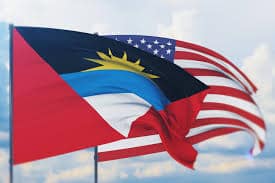
Prime Minister Gaston Browne has expressed concerns about the impact of tariffs imposed by the United States on China, Mexico, and Canada, warning that these trade policies could have inflationary consequences for Antigua and Barbuda and the wider Caribbean.
Speaking on Pointe FM, Browne noted that the Caribbean region is highly dependent on imports, particularly from the United States. He explained that any increase in costs due to tariffs on major trading partners of the U.S. could ultimately lead to higher prices for goods in CARICOM nations.
“A significant portion of what we consume in the Caribbean is imported from the United States,” Browne stated. “When tariffs are imposed on major global suppliers like China, Mexico, and Canada, it increases production costs, and those costs are inevitably passed down to consumers—including us in the Caribbean.”

Browne highlighted the broader economic risks associated with rising inflation, including a potential decrease in consumer purchasing power, economic instability, and increased cost of living. He also warned that if trade tensions escalate, the Caribbean could face supply chain disruptions, making essential goods more expensive and difficult to obtain.
The Prime Minister stressed that small island nations like Antigua and Barbuda are particularly vulnerable to external economic shocks, as they lack the domestic production capacity to offset rising import costs. He reiterated the need for CARICOM countries to expand their trading relationships beyond traditional partners and explore alternative supply chains, including those in South America.
“We must take proactive steps to reduce our economic vulnerability,” Browne said. “By strengthening trade partnerships with South America and diversifying our sources of imports, we can mitigate some of the risks posed by global trade conflicts.”
Browne also pointed out that trade wars often lead to retaliatory tariffs, which can further strain international markets and create uncertainty. He called on regional policymakers to closely monitor the situation and develop strategies to protect Caribbean economies from external economic shocks.
As global trade dynamics continue to evolve, Browne’s warning underscores the urgent need for small island states to adopt measures that enhance economic resilience. By reducing dependence on a single market and fostering new trade partnerships, Caribbean nations can better navigate the challenges posed by shifting U.S. trade policies.
Advertise with the mоѕt vіѕіtеd nеwѕ ѕіtе іn Antigua!
We offer fully customizable and flexible digital marketing packages.
Contact us at [email protected]
















we could always decrease some of our massive accross the board tarrifs/customs duties / rrc to offset the effect.
Everyday since Trumps ascendancy to the White House is more drama the world over. From massive deportation of illegal immigrants, cancelation of Black History Month Activities and more, they world is on edge as they wonder….what’s coming next! Trump ongoing trade issues and tariff war is his latest salvo that will have an effect everywhere. The mightly Trump has embraced tariffs as a tool to address issues far removed from trade. His drastic measures will weigh heavily on growth issues, raise prices everywhere and cost many economies jobs. We here in Antigua and the Caribbean is not immune from all this drama. The overall effect and impact on our economies will be huge.
Watch out folks food prices WILL be increasing. Guess that’s what he hinting at.
[…] Mexico, and Canada, warning that these trade policies could have inflationary consequences for Antigua and Barbuda and the wider […]
It’s commendable that PM Browne is addressing the potential economic challenges that US tariffs could create for the Caribbean. These policies can have serious ripple effects on small economies, and advocating for fairer trade terms is essential. That said, instead of just reacting to external policies, more proactive steps should be taken to strengthen economic resilience—such as boosting local manufacturing, increasing intra-regional trade, and negotiating better trade agreements with other global partners.
While highlighting the problem is important, the government should also be exploring alternative trade partnerships and local production strategies to reduce dependency on US imports.
Comments are closed.